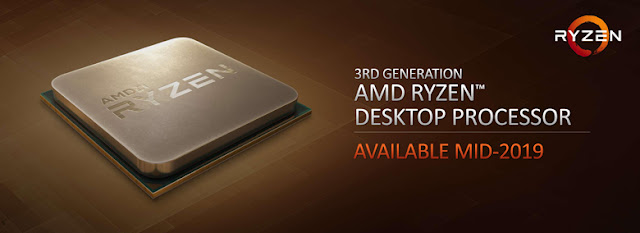AMD unveils world's first 7nm chip - beats Intel i9
There was no shortage of cutting-edge techs and glittering new devices in this year's CES, From VR bikes and robot butlers to paper-thin notebooks and foldable smartphones, gracing the show floor as they were to entice your inner nerd. Yet it was AMD that stole the show with a not-yet-finalized piece of silicon with two chiplets in it. And by the time you realized it was an early engineering sample of the company's upcoming Ryzen 3rd generation desktop processor - world's first 7nm desktop CPU, you probably couldn't care less about the rest of CES! We can't blame you either, it's Ryzen we're talking about after all - the processor that single-handedly changed the landscape of desktop computing in last two years. And from what we saw in CES, things are about to be shaken-up once more.
Expectation were pretty high when Dr. Lisa Su, Ceo and president of AMD, took to the stage to deliver her keynote address. Rumors and speculations were making rounds prior to the event within tech sites and forums, speaking of Ryzen 3000 series SKUs with some of them being too good to be true. Having been well aware of the anticipation, Dr. Su made good use of limelight that CES offers. AMD teased us with a working silicon, the aforementioned sample, of a 3rd generation Ryzen 8-core/16-thread CPU and showed glimpses of performance that we can expect from their upcoming high-end platform which will also be the first to support PCIe gen 4.0.
The de-lidded CPU die that AMD showed features a new chiplet design. The bigger chip is built on a 14nm GlobalFoundries process and it handles the I/O duties along with various controllers and connectivity. It's the somewhat inconspicuous smaller chip where in lie the next-gen cores(presumably housed within next-gen Core-complex or CCX), built on a bleeding-edge TSMC 7nm fabrication process. It's a clever design choice as the performance of CPU mostly depends on its cores. Also, splitting the manufacturing load between two fabs might help AMD overcome some early yield issues.
If you look carefully, as some keen-eyed reviewers did, you can see that there is just about enough space to nudge another 8-core/16-thread chiplet or perhaps even a graphics one in future. The 16C/32T config might be reserved for HEDT and socket TR4.
These new chips will also implement Zen 2 core design. Back in 2017 when AMD introduced it's completely new and forward looking Zen micro-architecture with the 1st gen Ryzen processors, the company also stated its commitment to improve and enhance the design in a regular and long-term basis. Staying true to that course, AMD launched 2nd gen Ryzen line up last year based on Zen+ micro-architecture which brought minor refinements along with a matured 12nm process. Zen 2 however is going to be the next big step in the architecture's logical evolution and we expect some major improvements in the core-design; The primary of those being an uplift in IPC (instructions per clock-cycle), one that would enable AMD to close-in on Intel's still superior single-threaded performance.
In a performance demo, AMD pitted its yet unnamed octal-core Ryzen 3rd gen against a Coffee Lake Refresh Core i9 9900K - Intel's flagship behemoth costing around 55,000 Rupees. The selected benchmark was Cinebech - one of the darlings of enthusiasts and reviewers around the world. AMD didn't disclosed the clock-speed of the sample but mentioned it's not final which means there is still room for improvement; the Intel chip ran on its default 3.6GHz/5GHz speed. Results are very impressive - The Ryzen actually completed the rendering faster(2057score, 135w) and consumed much less power than its Intel counterpart(2040score, 180w). There was also a gaming demo of Forza Horizon 4 and while it was running smooth @4K, we can't get much out of that.
From that Cinebench score alone, we can see that the 3rd gen Ryzen (R7 3700X/3800X??) is at least 15% faster than current flagship R7 2700x and matches Coffee Lake Refresh parts core-for-core. Even after taking Cinebench's multithread affinity into account, that seems like a remarkable generational leap for AMD. Not long ago we were used to accepting ~5% performance gain over previous gen CPUs, thanks to Intel and its stingy updates.
From the looks of it 3rd gen Ryzen processors should clock higher, how much we don't know. We can guess it's going to be in the range of ~4.5GHz to 4.8GHz. We also don't know at this point how much pure IPC gain AMD has achieved with these new breed of chips, just as we don't know how they are going to be priced. What we know is this - Ryzen 3rd gen is shaping up to be another powerhouse of a processor from AMD. With backward compatibility guaranteed, this is great news for existing AM4 users as they can just drop in these new CPUs for a clean and hassle-free upgrade.






No comments:
Post a Comment